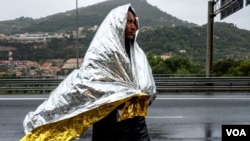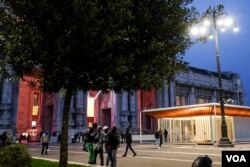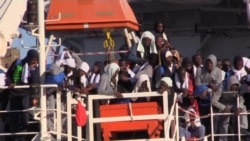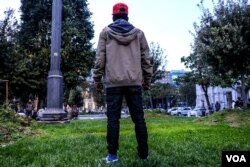Migrants have continued to arrive on Italy’s shores by the thousands this year. Most of them are Africans who hope to continue on to other European countries. But emergency border checks in place since last year mean many of them are stuck.
Cars whip quickly around the curvy mountain roads as rain fails on a chilly day in Ventimiglia, Italy. We are at the country’s border with France.
Groups of migrants are walking along the edges of the wet highway.
They come from Eritrea, Sudan, Ethiopia and other African countries. Most of them made the long land journey to Libya before finally boarding an overcrowded boat to cross the Mediterranean.
In search of better life
The migrants VOA spoke to requested not to be named. “I’m from Sudan. I have 24 years old. The government in Sudan is not good. Me, I came here to save myself,” he said.
He is hoping to get to France, where he says he has family. But for now, he and five other Sudanese men are walking through the rain looking for the nearby men’s migrant camp run by the Red Cross and the NGO Caritas.
WATCH: Migrants arriving in Sicily
Aiming for France
A local Catholic church, St. Anthony’s, houses around 100 migrant women and children in its basement. Abdul Rahman works as a volunteer translator at the church.
“The people go out and come, trying for France. They go to France, they’re trying and police send them back,” he said.
The European Union has struggled to meet the needs of the over one million migrants and refugees who have arrived since the start of 2015.
More than 140,000 people have crossed the Mediterranean into Italy so far this year. EU law says new arrivals should register in their first port of entry. But many of the Africans VOA spoke to said they did not file in Italy because they want to continue on to other European countries.
And now they are stuck. The border between Italy and France used to be relatively open, but now there are often passport checks.
The emergency border checks are due to expire in mid-November, though some EU countries are in favor of extending them further.
'Is this human rights?'
Not all migrants arriving in Italy head to Ventimiglia. Some head to Milan.
Outside Milan’s central train station, Gambians mix with Senegalese. An Ivorian and a Liberian man sit on the edge of a short wall. None of them have papers. They can’t legally leave Italy.
“I arrived here like four months ago, four months ago. Right now, I don’t know nothing. I came for rescue, that’s all,” said a Liberian migrant.
The 20-year-old left Liberia last year after his mother died of Ebola. He has a bed at a transit center in Milan. But others, like this Gambian man, are sleeping outside.
“I don’t know where to go. So I stay here in Central Station." said a migrant from Gambia. "I sleep here, really cold. I’m asking you, is this human rights people are talking about? I used to hear when I was a child, ‘human rights, human rights.’ Is it really, truly existing?”
In Europe, some countries have gone so far as to build physical walls to keep migrants out. That includes the U.K., Hungary, Austria and Macedonia.
Won't give up
But this man from the Gambia remains determined.
“Because it’s not easy for someone to leave his home and risk his life, to get in a fiber boat, about 300 people in a single boat, which can explode at any second, because of the political situation in my country, Gambia. We do not have freedom of speech. We do not have freedom of movement. You apply for jobs - there’s not room for you,” he said.
But is there room for him here? It’s an open question as he prepares for another night on the ground outside the train station.









